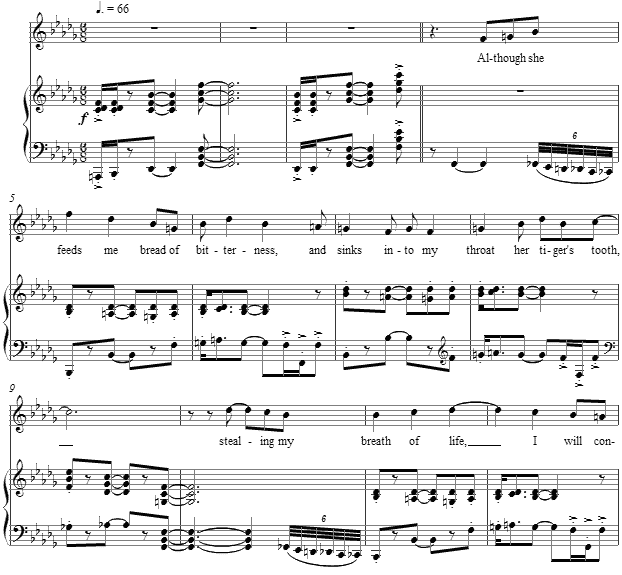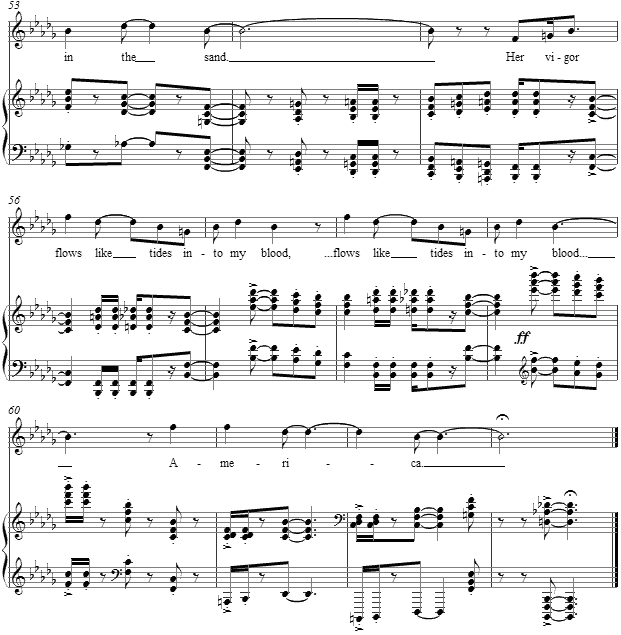Music and Texts of GARY BACHLUND
Vocal Music | Piano | Organ | Chamber Music | Orchestral | Articles and Commentary | Poems and Stories | Miscellany | FAQs
America - (2009)
Claude McKay
for medium voice and piano
Although she feeds me bread of bitterness,
And sinks into my throat her tiger's tooth,
Stealing my breath of life, I will confess
I love this cultured hell that tests my youth!
Her vigor flows like tides into my blood,
Giving me strength erect against her hate.
Her bigness sweeps my being like a flood.
Yet as a rebel fronts a king in state,
I stand within her walls with not a shred
Of terror, malice, not a word of jeer.
Darkly I gaze into the days ahead,
And see her might and granite wonders there,
Beneath the touch of Time's unerring hand,
Like priceless treasures sinking in the sand.[ 4 pages, circa 1' 55" ]
Claude McKay
The text is found in Harlem Shadows, The Poems of Claude McKay, New York: Harcourt, Brace and Company, 1922. As McKay was a part of the reputed Harlem Renaissance and a young socialist in a time when socialism had a fashionable idealism rooted in freedom rather than mere government control, this text is an interesting expression of passion for the nation's "vigor" and "bigness." McKay finds strength in this, as did Martin Luther King four decades later. That freedom was at one time the moving force behind black art and politics, it is interesting to note that freedom has become lost in the shuffle of modern politics in which political correctness has trampled McKay's "strength," and perhaps becoming "priceless treasures sinking in the sand."
This sense of "vigor" and "bigness" has become withered with the advent of James H. Cone's reverse racism in the form of black liberation theology, in which he advocated that "Black theology refuses to accept a God who is not identified totally with the goals of the black community. If God is not for us and against white people, then he is a murderer, and we had better kill him." (Black Theology and Black Power, 1969)
It is sadly amusing to note that this was among the reading list I was given in a class at Immaculate Heart College by one of the nuns whose advocacy basically helped tear apart that Catholic order and contributed greatly to the closing of the college some years later. Reading it then, it seemed outright foolishness, and revisiting it today in light of considering McKay's greater vision of America it seems all the more foolish when one considers the continuing divisiveness of the so-called "race dialogue" which has become the antithesis of Dr. King's "I have a dream," one of those "priceless [American] treasures sinking in the sand." The greatest of these "priceless treasures" is freedom for all men, not for some, and this dream becomes trampled by the advocacy of a covert form of class struggle as seen through Marxism, as scholarly critics of black liberation theology have well argued. I conclude that McKay's text from eighty years ago adequately expresses this as well, foreshadowing as he gazed "darkly" into "the days ahead," days filled with hundreds of millions of victims of National Socialism, Soviet Socialism as well as the bankrupting of whole African nations courtesy of this perversion of government which consistently concludes with a privileged elite ruling class atop the socialist state at the expense of the ordinary citizen.
As he sought greater freedom not only for himself but for a people, McKay openly and unabashedly says he loved our "cultured hell" for its vigor and bigness -- as do I. My answer to Cone's inane and now dated stance comes in the form of a short poem as well, God Ain't White, just as my appreciation for McKay's art comes in setting this text to music.
The text is adapted into a short four verse form, AABA, by repeating a line at the end and then beginning of the next verse. The syncopation within the 6/8 meter pushes the "bar line" forward rhythmically in an Americana style, and "vigor" is represented by the shift between duple and triple gestures within a given measure.
The short coda for this piece repeats the line which speaks of the "vigor" of America and then ends with the nation's name which is the title of McKay's poem.
The score for America is available as a free PDF download, though any major commercial performance or recording of the work is prohibited without prior arrangement with the composer. Click on the graphic below for this piano-vocal score.


